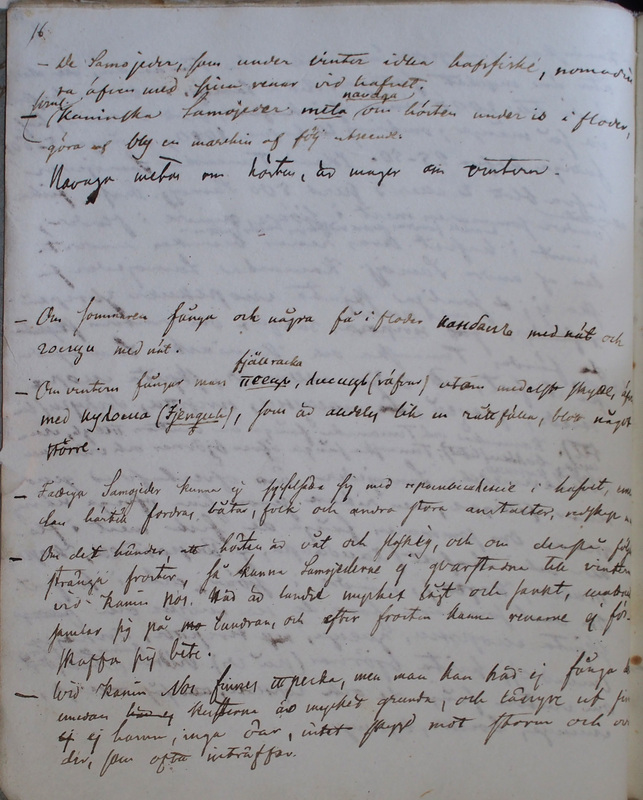Ethnographiska, historiska och statistiska anmärkningar. 016
Title
Description
| De Samojeder, som under vinter idka hafsfiske, nomadise rа äfven med sina renar vid hafvet. |
Those Samoyeds who during the winter are engaged in sea fishing also live with their reindeer by the sea. |
| Kaninska Samojeder meta
navaga
om hösten under is i floder,Ru navaga, TN наваңа ʻnavaga’. (Eleginus nawaga).
göra af bly en maschin af följ[ande]. utseende.
Description and picture missing.
Navaga metas om hösten, är mager om vintern. |
The Kanin Samoyeds fish for navaga with a seine in the autumn under the river ice; they make a device of lead with the following appearance [description and picture missing]. Navaga are fished for with a seine in the autumn; they are lean in the winter. |
| Om sommaren fånga ock några få i floder
камбала
ochRu kambala, TN пелха ʻEuropean plaice’ (Pleuronectes platessa).
голци
med nät.Ru golec, TN няңгэхей ʻArctic char’ (Salvelinus alpinus).
|
In the summer some also catch European plaice and Arctic char with nets in the rivers. |
| Om vintern fångar man псецъ fjällracka, лисицъ (räfvor), utan medelst skydd äfven med кулома
(Ijenguh),
som är alldeles lik en råttfälla, blott något Most probably TN еся яңго ‘foothold trap’, literally ʻiron trap’. Trapping was practised from November to March, when the fox fur was at its most beautiful and valuable. The traps were set just under the snow so that the bait, seal, lemming, or fat, would be below the wind. Often, the front leg was trapped. Foxes were also trapped with dead-fall and cage traps (пя яңго) and through communal hunting, in which a group of foxes was driven to an open space, for example a frozen lake cover, and then shot. (Chomič 1966: 66-68.)
större. |
In winter Arctic foxes and foxes are also hunted with traps such as kuloma (Ijenguh), which are very similar to a rat trap, only slightly bigger. |
| Fattiga Samojeder kunna ej sysselsätta sig med промышление i hafvet eme- dan härtill fordras båtar, fock och andra stora anstalter, redskap m.m. Om det händes, att hösten är våt ocj slaskig och om derpå följes stränga froster, så kunna Samojederne ej qvarstadna till vintern vid Kanin Nos. Här är landet mycket lågt uch sankt, emedan samlar sig på tundran, och efter frosten kunna renarna ej för-skaffa sig bete. |
Poor Samoyeds are unable to engage in seafaring activities, because it requires boats, a headsail and other major preparations, equipment, etc. If it happens that the autumn is wet and sloppy and therefore there are severe frosts, the Samoyeds cannot stay on the Kanin Peninsula until winter. The country is very low and boggy, and that is why [the frost] accumulates on the tundra, and after the frost the reindeer cannot find food. |
| Wid Kanin Nos finnes треска, men man kan här ej fånga den, emedan här ej kutterna äro mycket grunda, och långre ut finnes ej ej hamn, inga öar, intet skydd mot storm och oväder, der, som ofta inträffas. |
There are cod off the shores of Kanin Nos, but you cannot catch them here, because the bays are not very shallow, and further out there are no harbours, no islands, no protection against storms and bad weather, which often occur. |

